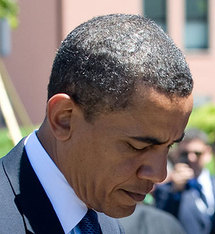Obama calls US defense budget a victory for reform
AFP
WASHINGTON - US President Barack Obama Wednesday signed a 680-billion-dollar military budget bill, saying his campaign to stamp out Pentagon waste proved political change was possible in Washington.
A significant civil rights move was also attached to the legislation by Congress -- a hate crimes bill which outlaws offenses motivated by a person's race, gender, identity or sexual orientation.

"In fact, I think that wasting these dollars makes us less secure -- and that's why we have passed a defense bill that eliminates some of the waste and inefficiency in our defense process."
But warning that the bill was not perfect, the president vowed to carry on fighting to cut waste in the defense budget, which is often packed with pet projects of lawmakers for their home states.
Defense Secretary Robert Gates, a holdover from the previous administration, pledged to renew Obama's effort to cut waste in the massive Pentagon budget in subsequent spending bills.
"I would emphasize that this bill and this budget are just the beginning. The Pentagon is not the kind of place that can turn on a dime. It will take more than a single budget to get where we need to be."
The authorization bill satisfied most of the funding requests made in the Pentagon's budget submission for the 2010 fiscal year that began on October 1. It reflected a compromise hammered out between the two houses of Congress.
But lawmakers defied Obama's earlier veto threat and approved 560 million dollars to continue work on an alternative engine for the F-35 fighter jet built by General Electric and Rolls-Royce.
The Defense Department said it was disappointed with the move as well as funding for additional C-17 transport planes but said that the overall budget was a triumph for reform efforts.
"He (Gates) and the president have ended up with basically 95 plus percent of what they laid out on April the 6th," in their budget request, Pentagon press secretary Geoff Morrell told reporters.
"That is extraordinary, that is historic," he said, adding that Gates had been ready to recommend a veto of the bill if funding provisions for the second engine had threatened to disrupt the whole F-35 program.
The administration won a fight over the future of F-22 fighter aircraft, capping production at 187 of the jets, meaning only four more of the costly Boeing-Lockheed Martin-built planes will be built.
Gates had pushed for the limit over vehement objections from air force leaders and some lawmakers.
The authorization act also cut a hi-tech vehicle in the Army's Future Combat Systems program, an airborne laser, and a costly fleet of presidential helicopters held up as a symbol of defense budget excess.
The US Navy charged Lockheed Martin to build a new fleet of 28 presidential helicopters in 2005. The project originally was meant to cost around six billion dollars but sky-rocketed up to 11.2 billion dollars.
The legislation also raises military pay by 3.4 percent and assigns 6.7 billion dollars for mine-resistant armored vehicles known as MRAPs, which is 1.2 billion dollars more than the administration had proposed.
Another 7.5 billion dollars was inked for training and equipping the Afghan police and army.
The hate crimes legislation was named after Matthew Shepard, a student murdered 11 years ago in an attack in Wyoming.
Conservatives opposed to the bill however argue that it would discriminate against priests who speak out against homosexuality for religious reasons, and warn Obama is pursuing a radical agenda.
--------------------------------------------------------------------------------------------------------------------------------